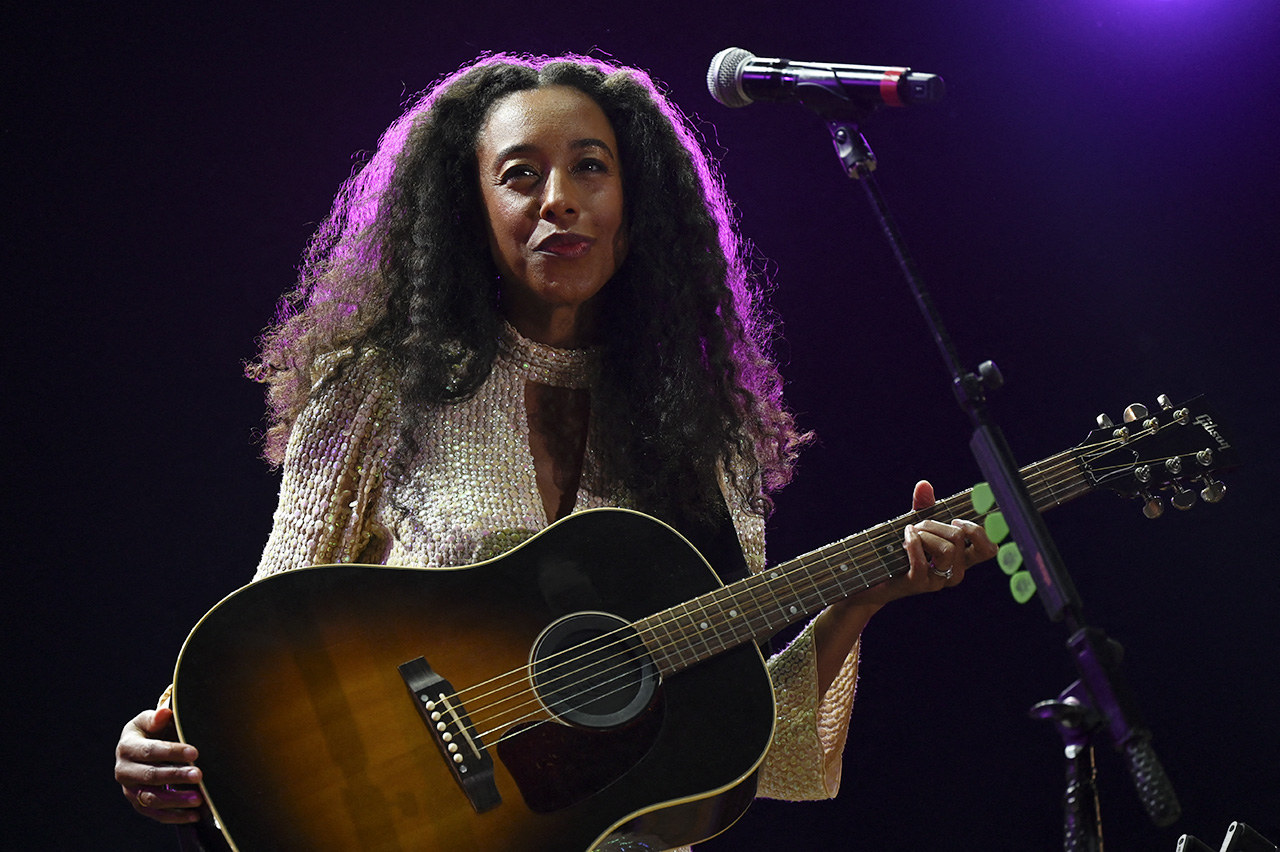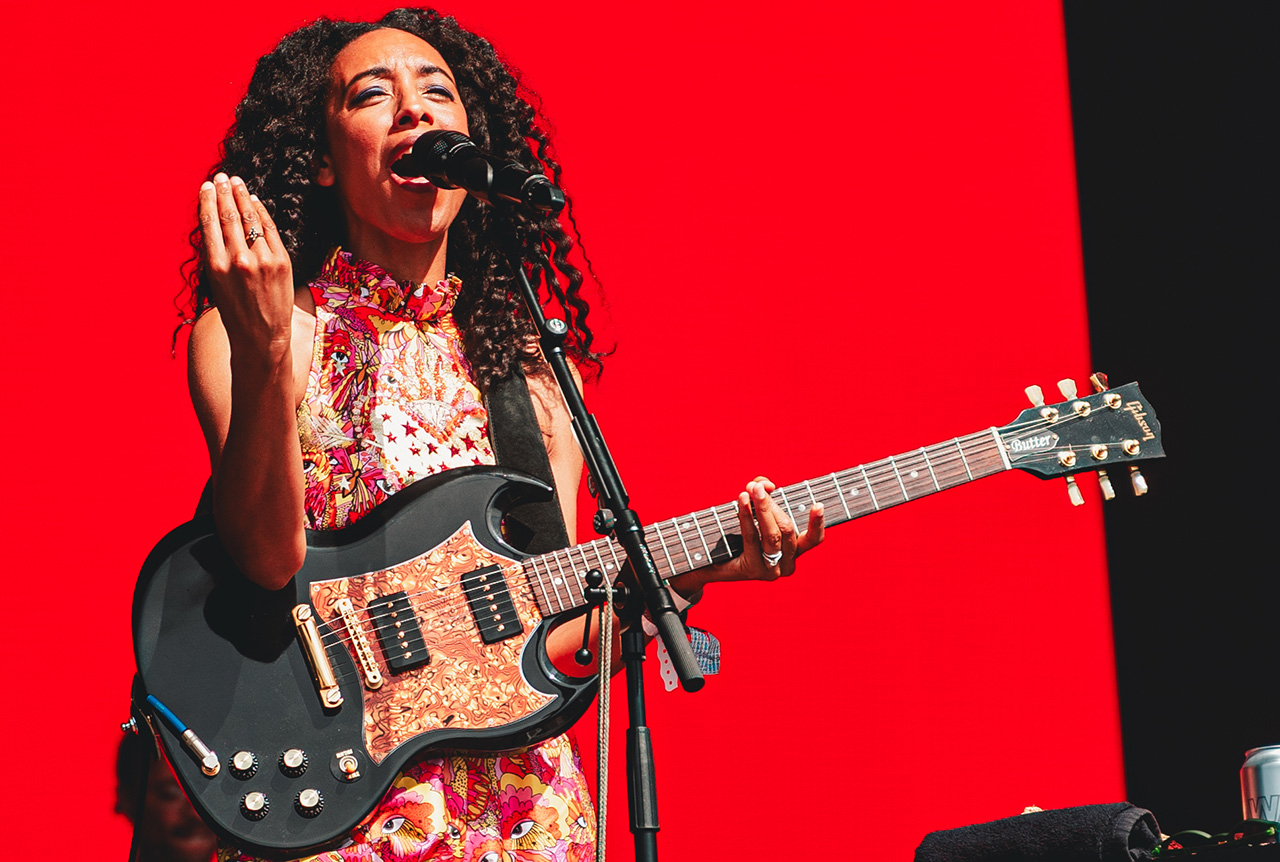
For someone who’s performed at the White House alongside jazz great Herbie Hancock and welcomed Esperanza Spalding and Bill Withers to previous studio albums, it’s surprising to hear Corinne Bailey Rae admit she’s still looking to get better at collaborating.
Her latest team-up, though – working with the students of the Guildhall Session Orchestra to craft fresh arrangements for her Mercury Prize-nominated record Black Rainbows – pushes her to new heights.
Worlds away from the breezy, radio-friendly hit Put Your Records On, Black Rainbows explores Black femininity, ancestry, and music as a vessel for transcendence. The results include carnal cacophony (Erasure channels early Rid Of Me PJ Harvey heft) and cascading electronica (the mighty Put It Down).
That album isn’t her only release to generate awards heat. Rae's self-titled 2006 debut positioned her as the fourth female British act in history to top the charts with her debut album, and bagged her Best Newcomer and Best UK Female honors at the MOBO Awards the same year.
Ahead of the Black Rainbows show with the Guildhall Session Orchestra at the Roundhouse Three Sixty, the Leeds native dials in from her home in Yorkshire to reflect on that “brilliantly hectic” period and why she’s no longer the media’s sunshine girl.
What are your early memories of music?
“I played violin as a kid; that's my musical training. But I’m not a composer; it's all instinctual. Our youth leader at church was into Radiohead, Bjork, and Nirvana. He empowered us to feel like our ideas were valid.
“I’d always seen the guitar as a thing for really accomplished people like Jimi Hendrix – watching Nirvana on MTV Unplugged, seeing that it was a barre chord up and down the guitar, exploded my brain.”
You formed an all-female punk band called Helen in your teens. Who were your guitar heroes growing up?
“Bands like Juliana Hatfield, Veruca Salt, or even Hole. The parts weren't complicated, but they could say so much, and they were telling women's stories. Juliana Hatfield’s got that song, Sister – I’d never heard music like it. It’s torn from the pages of your diary. Guitar solos weren’t fashionable in my band scene. It was almost like punk or grunge was the opposite of virtuosic.”

You quit university when you were offered a record deal, but it fell through and the group disbanded, so you returned to finish your degree. How did that impact your desire to become a solo performing artist?
“When I left university, I worked at House of Fraser’s jewelry department, but I was writing songs with different people in London. They became the songs for my first record. I already had Like A Star and Butterfly, then they needed a more radio-friendly song.
“I wrote that riff for Put Your Records On on my bed, went on the train, and finished it together with Steve Chrisanthou and John Beck. Suddenly the calendar was filled every single day. I’d say, ‘Wow, there’s only two days off that month?’ They’d be like, ‘It’s fine!’ It was so brilliantly hectic.”
The following year, you flew out to the Grammys to host an award – then Justin Timberlake called your name for Album of the Year. What are your memories of the night?
“I didn’t realize I was even in the mix; I thought, ‘It’s nice to be adjacent to the Grammys!’ I performed this hybrid thing with John Legend and John Mayer. The MusiCares event was in recognition of Aretha Franklin – so I sang an Aretha Franklin song in front of Aretha Franklin.
“It was mad. People were like, ‘Prince has come to the show. Stevie Wonder wants to talk to you!’ Elton John sent me a case of champagne when the record went to number one.”
You recorded Black Rainbows in Chicago and finished it in Leeds. What does your studio space look like?
If I put the Gibson to this particular bit of the speaker, it’s going to do this thing. I love the out-of-control nature
“It’s a real wonderland for us. My husband Steve [Brown] is really into technology. We have a huge mixing desk and loads of vintage synths and tape machines. Steve’s got a big Eurorack world so he can build reverbs.
“Often, we want to record in space, like in air. A lot of the vocals for Black Rainbows I did at the desk – it wasn’t in the booth. But we’ve treated the whole space so that you can record anywhere.
“With music, it's by any means necessary: we’ll record on our two-inch tape machine if we need to, but I’ll also record on a laptop under the duvet in a hotel room.”

You’ve spoken about being a production nerd, moving hi-hats around and lining up instruments because you’re interested in the arrangements. How has that developed?
“It’s something I always did when I was in my band. My first record went from four people standing in a room to more studio-based, layered things. I drove Steve Chrisanthou crazy with snare sounds – he’d be like, ‘I've made you a cup of tea. There are 900 snare sounds to go through. When I get back, I want you to have chosen five!’
“Some people walk into a studio where everything is done, and someone teaches them their parts. That’s a different way of being an artist. The fun part for me is solving the puzzle.
“Making a record, you have to have someone with a stopwatch saying, ‘You’re done now!’ You can’t tell the difference between mix 24 and mix 25, and that’s when it’s time to go!”
At Glastonbury last year you had your glorious Gibson SG with P90s and custom scratch plate. Why are you such a fan of that guitar?
“That guitar has so much weight, especially for my song Erasure. I know that if I put the guitar and headstock to this particular bit of the speaker, it’s going to do this thing. I love the out-of-control nature.
“I missed the snarling aggression of what I used to do as a teenager. I’m not a technical guitarist, but I can play on one string all day long, like New York Transit Queen. I love kicking out that song. That sort of aggression was really important in the record.
“When I was making my third record, I struggled at the label, and somebody said something like, ‘You’re the sunshine girl.’ I remember thinking, ‘I don’t feel like the sunshine girl.’ I’d been through big changes in my life.
“This record has given me permission: ‘You can be all the yous, you can draw from all the musical experiences, and you can write about anything. If it's interesting to you, it’ll be interesting to at least one other person.’”
- Corinne Bailey Rae performs Black Rainbows live with the Guildhall Session Orchestra as part of Roundhouse Three Sixty on April 27.







